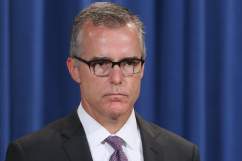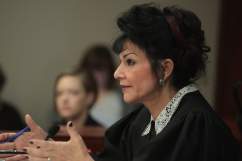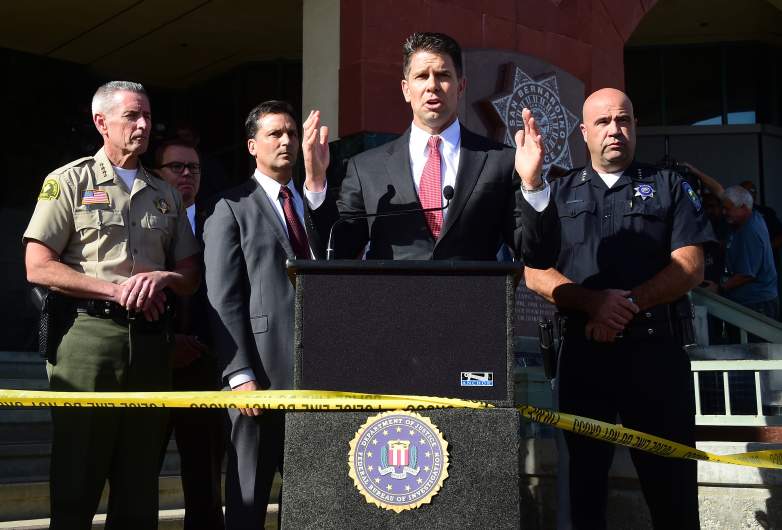
David Bowdich.
David Bowdich is set to become the second-highest ranking FBI official after the retirement of Deputy Director Andrew McCabe, The Washington Post reports.
Bowdich, 48, is currently the FBI’s associate deputy director, making him the third-highest official in the agency. McCabe is on leave until his March retirement and Bowdich will fill his role in an acting capacity. Deputy Attorney General Rod Rosenstein will then decide whether Bowdich remains in the position or if he is replaced by someone else in consultation with FBI Director Christopher Wray, who is is said to want to put together his own leadership team.
According to NBC News, McCabe was pushed out of the FBI after attacks from President Donald Trump.
Here’s what you need to know about David Bowdich:
1. Bowdich Is Well-Liked Among Those in the FBI & Was Seen as Someone Rising to the Top of the Agency
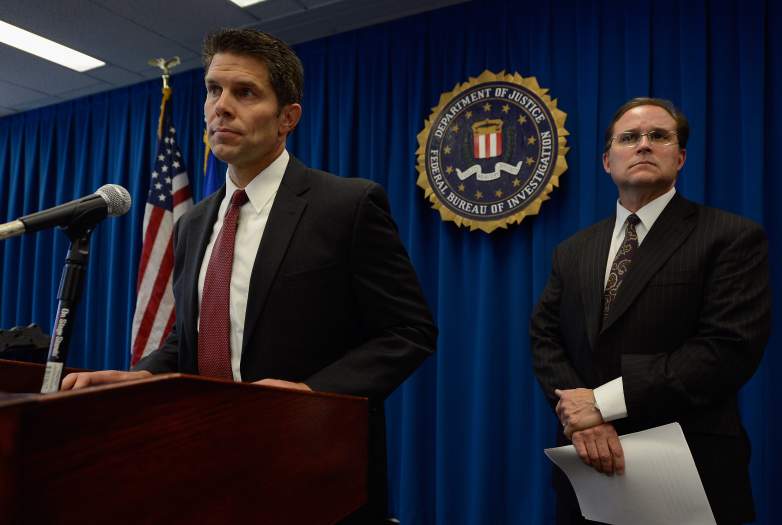
David Bowdich in 2012.
FBI Director Christopher Wray had been leaning toward promoting David Bowdich to replace Andrew McCabe for several months, the New York Times reported in December. According to the Times, Bowdich is well-liked within the FBI and is seen as being outside McCabe’s inner circle.
Bowdich has been in the FBI since 1995 and has long been viewed as someone who is “next in line” to rise up the ranks of the agency, according to Newsweek.
Former Special Agent Frank Montoya Jr., who oversaw the FBI’s Seattle office, told Newsweek Bowdich is a “good man” who is “fair” and “objective” and has a good reputation among agents.
Katherine Schweit, a retired FBI executive, told Newsweek that Bowdich is a “great guy,” adding that he’s “well respected.”
2. He Was Involved in Conversations About the Loretta Lynch-Bill Clinton Tarmac Meeting & Talked to Comey About Trump’s Request for Him to Back Off Flynn
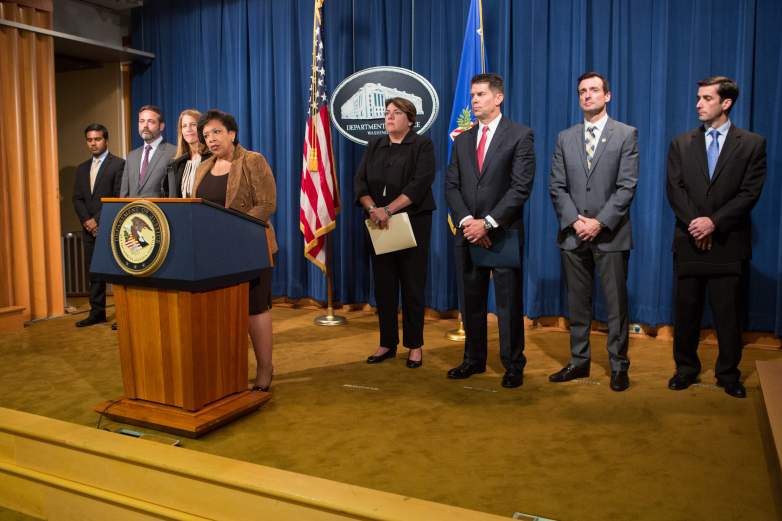
David Bowdich listens as Attorney General Loretta E. Lynch speaks at a 2016 press conference.
Bowdich has found himself at involved in two political incidents in recent years. According to FBI documents, Bowdich was involved in email discussions led by then-FBI Director James Comey about then-Attorney General Loretta Lynch’s controversial tarmac meeting with Bill Clinton. Bowdich had recently been promoted to a role as a senior FBI official in Washington. The meeting between Lynch and Clinton was held while the FBI was investigating Hillary Clinton’s use of a private email server.
Bowdich could also be called as a witness in Special Counsel Robert Mueller’s investigation into Russia’s interference in the 2016 election, Vox reported in August.
McCabe told Bowdich and other FBI officials that they could be interviewed about conversations they had with Comey about Trump’s alleged request that the FBI back off its investigation into Michael Flynn. Comey testified before Congress that he spoke to Bowdich after the January 27 call with Trump. According to Vox, Mueller is investigating whether Trump obstructed justice by requesting that Flynn be left alone.
Bowdich also has ties to Mueller. He was picked by Mueller in 2011 to handle the transition to a new FBI director after Mueller’s 10-year term expired. But that role become irrelevant after Mueller received a two-year extension. Bowdich was then named as special assistant to the associate deputy director, a role he held for about a year.
3. Bowdich Was the Face of the FBI After the San Bernardino Terror Attack
David L. Bowdich was the face of the FBI after the San Bernardino terror attack in 2015 and led its investigation into the shooting.
At the time, Bowdich was the assistant director in charge of the FBI’s Los Angeles Field Office. He was appointed to that role in 2014 by James Comey after working from September 2012 until December 2014 as special agent-in-charge of the Los Angeles Field Office’s Counterterrorism Division, according to a press release.
As the counterterrorism division leader, Bowdich, “led the Joint Terrorism Task Force, responsible for all counterterrorism investigations and operations in the Los Angeles region and surrounding counties, as well as overseas investigations in Southeast Asia. As SAC, Mr. Bowdich was also in charge of all Los Angeles Crisis Response assets.”
He left the Los Angeles office in April 2016 when he was promoted to associate deputy director by Comey. “In this role, he oversees the management of all FBI personnel, budget, administration, and infrastructure,” the FBI’s website says.
During his time in LA, Bowdich talked to the Los Angeles Times about his job, including investigations into public corruption.
“As to political corruption, the message sent by the prosecutions should be encouraging to taxpayers,” he told the newspaper. “We have a lot of good politicians. When we have allegations of a bad apple, we’ll go after that extremely aggressively. That’s what makes our government different from so many others.”
4. He Began His Career as an Agent in San Diego Where He Was a Sniper, SWAT Team Operator & Investigated Violent Crimes & Gangs
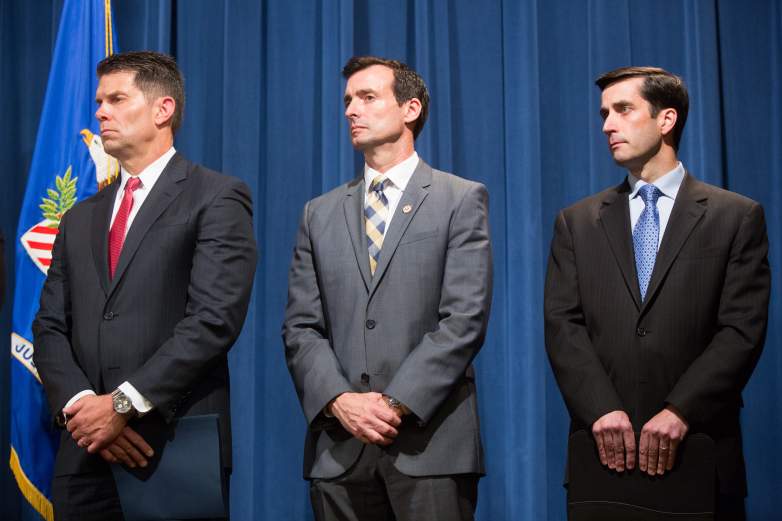
GettyLeft to right, FBI Associate Deputy Director David Bowdich, U.S. Attorney Wifredo Ferrer of the Southern District of Florida, and Acting Director Dermot O’Reilly of the Defense Criminal Investigative Service, listen at a press conference on June 22, 2016 in Washington, DC.
Bowdich joined the FBI in 1995 and was first assigned as a special agent in the agency’s San Diego field office, according to his biography on the FBI’s website. In San Diego, Bowdich, “investigated violent crimes and gangs and served as a SWAT Team operator and sniper. He led a yearlong wiretap investigation that culminated in the first federal racketeering convictions ever to be brought against street gang members in the Southern District of California.”
In 2003, Bowdich received his first promotion to the FBI’s Washington headquarters when he was assigned to the Safe Streets and Gang Unit. He spent two years there before returning to San Diego.
“In late 2005, Mr. Bowdich returned to San Diego and supervised a multi-agency gang task force. In this role, he led agents and detectives who investigated racketeering and drug cases against the Mexican Mafia, Bloods, Crips, and the Hells Angels Motorcycle Club using wiretaps and undercover operations,” according to the FBI’s website.
Bowdich then became the assistant special agent-in-charge of the San Diego Field Office in 2009, according to his bio.
“In this role, he oversaw all non-white-collar criminal violations and the Imperial County Resident Agency. He recognized an emerging kidnapping trend perpetrated by Mexican cartel-related criminal enterprises. In response, Mr. Bowdich formalized and initiated the first FBI hybrid squad in the country designed to target the threat posed by the kidnapping cells operating on both sides of the United States and Mexican border,” the FBI’s website says. “Within one year, the interagency squad constructed a large-scale RICO case against 43 cartel members and associates who operated multiple kidnapping cells in the San Diego region. During this assignment, Mr. Bowdich also oversaw the murder investigations of two United States Border Patrol agents who were killed in the line of duty.”
5. Bowdich, Who Is Married With 2 Kids, Worked as an Albuquerque Police Officer Before Joining the FBI & Attended New Mexico State University & Georgetown
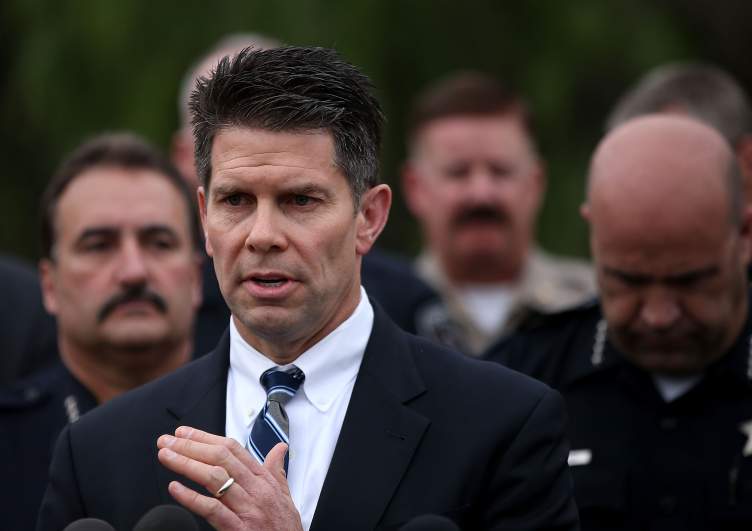
David Bowdich.
David Bowdich is married and has two children, according to an FBI press release from 2014.
Bowdich worked for the Albuquerque Police Department before joining the FBI. He served as a police officer and detective in the New Mexico city.
According to the FBI’s website, “He earned a Bachelor of Science degree in criminal justice from New Mexico State University and a Master’s Degree in leadership from Georgetown University’s McDonough School of Business.”
Bowdich told the Los Angeles Times in 2015:
It’s a very delicate time in law enforcement right now, and how we react and how we engage with communities is so important. Law enforcement has to evolve with society. This is where recruiting is a big part, to mirror the communities we serve. It takes time and it’s not always easy. L.A. is a perfect example: I have, I believe, five Farsi speakers in this office. I could use more. I could use more of many languages. Much of the public supports law enforcement a lot more than you actually hear. [But] it’s a perishable relationship. You have to earn that, and when you make mistakes, you have to take it on the chin and make changes.
When asked by the Times what his favorite law enforcement movie is, Bowdich said, “‘The Untouchables.’ Eliot Ness’ character was unyielding, tenacious, principled. That describes what a law enforcement professional should be.”
